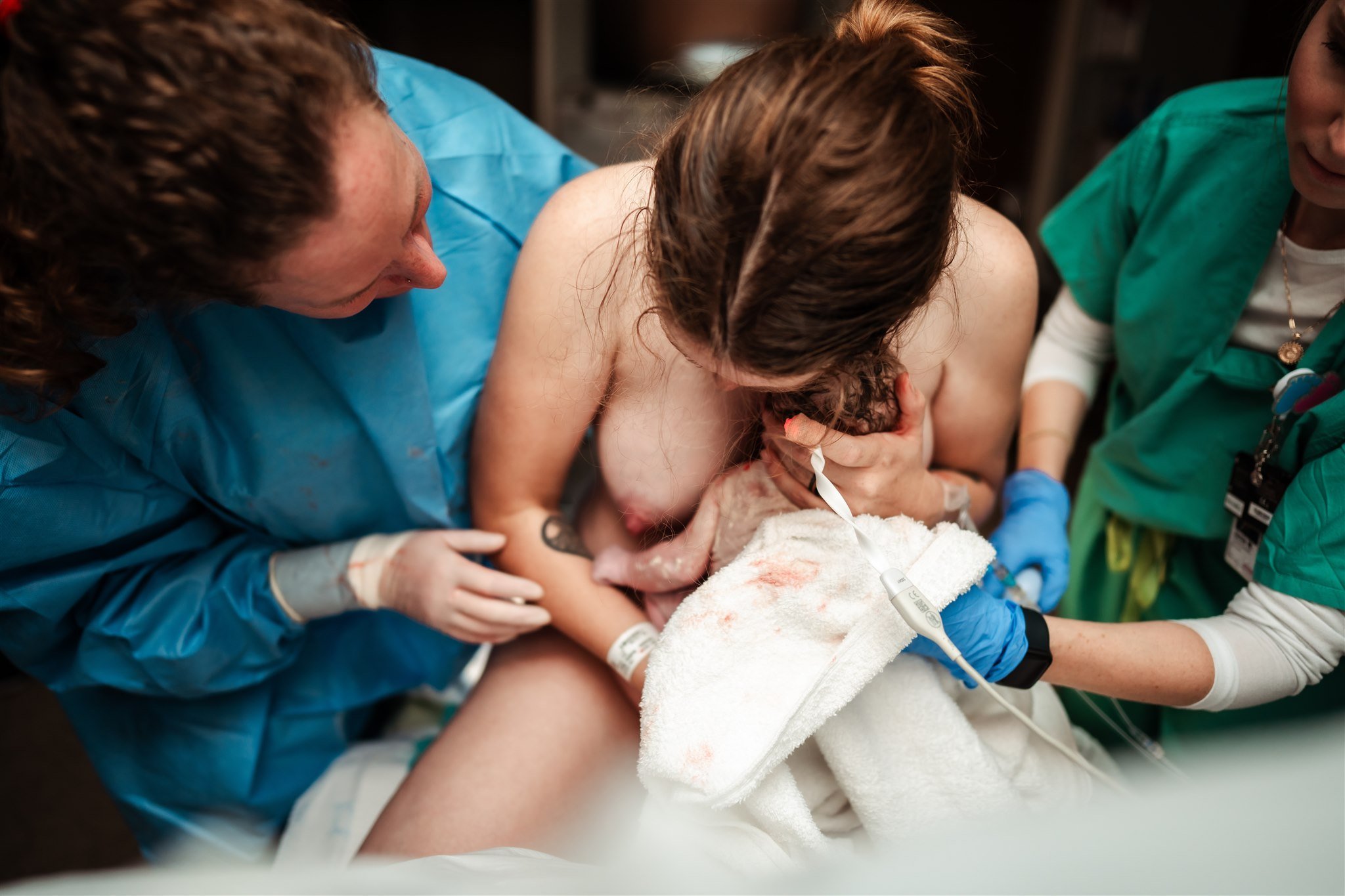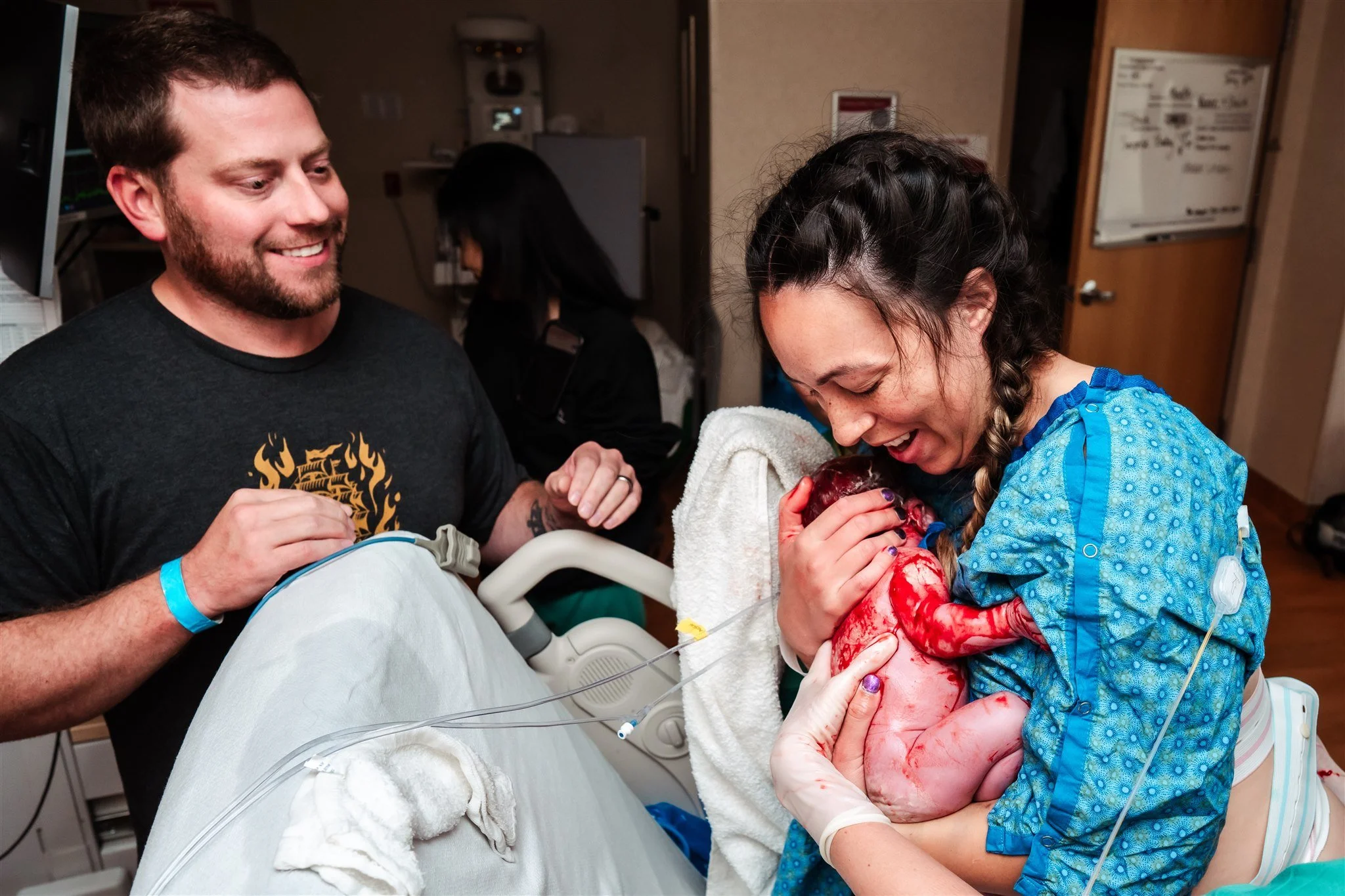Birth After C-Section: How to Plan for a VBAC in Denver
As a birth doula and photographer in Denver, I’ve had the honor of supporting so many families on their birth journeys—and I’ve seen firsthand how healing, empowering, and transformative a VBAC (Vaginal Birth After Cesarean) can be. For those who have walked through the deep, layered experience of a cesarean birth, the desire to birth again vaginally isn’t about proving anything to anyone. It’s often about reclaiming agency, reconnecting to your body, and walking forward with intention.
We’ve come a long way since the outdated belief that "once a cesarean, always a cesarean." Still, many people don’t realize they even have options. This blog is here to open the door to possibility—so you can move forward with clarity, choice, and care that meets you where you are.
What Is a VBAC?
VBAC stands for Vaginal Birth After Cesarean. It's exactly what it sounds like: the option to give birth vaginally after having had a previous cesarean birth.
Some other terms you’ll often hear are TOLAC—Trial of Labor After Cesarean. This refers to the process of attempting labor, with the goal of achieving a VBAC. If labor progresses and results in a vaginal birth, it’s considered a VBAC. You may also hear the term HBAC, which stands for Homebirth After Cesarean. As a doula, I love supporting families in their pursuit of VBAC—because even if a cesarean becomes the best choice for the family, I know that the experience will still be informed and supported.
Why VBAC Matters
For many, choosing a VBAC is about more than just how their baby is born. It’s about how they feel as they birth their baby—supported, informed, and powerful.
VBAC can offer a shorter physical recovery compared to major abdominal surgery. It also lowers your risk of complications in future pregnancies—especially when fewer cesareans are involved. For many, it can be an emotionally healing experience, particularly if their previous birth felt disempowering or traumatic. VBAC often brings a deep sense of autonomy, agency, and renewed trust in your body after a surgical birth.
Birth isn't just physical. It's emotional, spiritual, and life-changing. And for those who desire a different path than before, VBAC can offer that space.
VBAC is Safe
One of the most common questions I hear as a doula is: “Is VBAC really safe?” And the answer, backed by decades of research and clinical practice, is yes—for many people, VBAC is a safe, evidence-based option.
VBAC success rates fall between 60–80%, depending on individual health, previous birth history, and current pregnancy circumstances.
The risk of uterine rupture, often cited as the primary reason to avoid VBAC, is typically less than 1% for those with a low transverse uterine incision.
The American College of Obstetricians and Gynecologists (ACOG) openly supports VBAC as a safe and reasonable option for most individuals.
VBAC is safer and more achievable than many people are led to believe. Most hospitals have protocols in place to carefully monitor VBAC labors. From continuous fetal monitoring to rapid access to surgical teams if needed, safeguards are in place to protect both the birthing person and the baby.
But hospitals aren’t the only place VBAC can be safely supported. Many licensed midwives in Denver and beyond also attend home VBACs, bringing their deep knowledge of physiological birth and years of experience into the process. These midwives are trained to monitor closely throughout labor, use their intuition and skills to assess unfolding risks, and collaborate with medical providers if transfer becomes necessary.
Whether you’re drawn to the hospital setting or the comfort of birthing at home, VBAC can be supported in both environments. What matters most is finding a care team that respects your body, honors your preferences, and provides evidence-based guidance tailored to your specific needs.
But here’s what’s often left out of the conversation: safety doesn’t mean one-size-fits-all. VBAC is not about convincing someone to pursue a certain kind of birth—it’s about providing the evidence, supporting autonomy, and trusting each birthing person to make the decision that feels most aligned for them.
Unfortunately, too many are told VBAC “isn’t allowed” or “isn’t supported,” not because of medical risk, but because their provider or hospital is uncomfortable or unwilling to offer that option. That’s not informed consent. That’s provider preference presented as medical fact.
A truly supportive provider will review the research with you, listen to your story, and help you weigh the risks and benefits from a place of partnership. They will walk beside you, not ahead of you, and they’ll keep the door open for conversation—not close it before it begins.
Your previous cesarean should never erase your future choices. You deserve care that honors your experience, supports your voice, and makes space for the birth that’s right for you.
My Doula Advice for Supporting Your VBAC Goals
Achieving a VBAC starts with you intention and a supportive team surrounding you. One of the most powerful things you can do is build a team that truly believes in your ability to birth. That includes finding a provider who supports VBAC not just in theory but in practice, asking clear questions like, “What is your VBAC success rate?” and choosing a doula who understands the nuances of VBAC and knows how to advocate with and for you.
It’s also about your own preparation. Educate yourself and educate your partner. Ask the hard questions. Create a birth plan that centers your values and reflects the kind of experience you hope to have. When your care team respects your wishes and walks alongside you, it makes a world of difference in how you feel throughout the process—especially when things become unpredictable.
If you’re looking for additional resources, I highly recommend exploring ICAN (International Cesarean Awareness Network) and Evidence Based Birth and The VBAC Link.
And if you want a place to start for planning your Denver birth definitely start with this blog where I share my recommendations for Local Birthing Options Around Denver where I share about VBAC friendly Doctors. You’re also welcome to reach out to me for doula care or VBAC consultation support. I am VBAC Link Certified and I’m always here to help you find your team and prepare for the birth that feels most aligned for you.
You deserve to feel informed, encouraged, and supported every step of the way. This journey is yours—and you don’t have to walk it alone.
As you explore your options after a cesarean, I want you to know this: you are not stuck. There is no one “right” way to birth after Cesarean.
Whether you feel drawn to VBAC or choose a repeat cesarean, your decision is valid. You are not less brave, less informed, or less of a parent because of how your baby enters the world.
What matters is that you feel empowered in your choice—that it reflects your values, your intuition, and your lived experience. That is what true autonomy looks like.
You’re allowed to learn, ask questions, change your mind, and advocate for the kind of birth experience that feels safest and most aligned for you. You’re allowed to want more support, to ask “why not?”, and to believe in the strength of your body—even after a surgical birth.
If you need someone to walk this journey with you, I’m here. Whether you’re planning your next birth or simply beginning to explore what’s possible, I’m honored to stand beside you.
Your birth story matters—and it deserves to be one you feel proud of.
Welcome
I’m Lindsey Eden
Doula and birth photographer based in Denver Colorado! Mama of two and passionate believer that documenting the journey of birth can heal and change lives!
MORE BLOGS YOU’LL LOVE
Follow along for more on Instagram



















